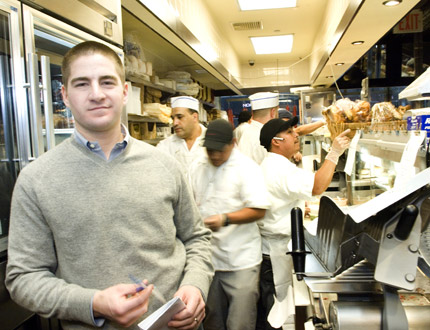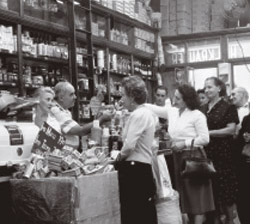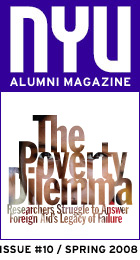alumni q&a
Corned Beef, Revisited
Two young entrepreneurs
revive a New York institution
Jeremy Lebewohl / CAS '05
by Jason Hollander / GAL '07
On the morning of January 1, 2006, many New Yorkers woke with a heavy heart. It was the first day in 51 years that the 2nd Ave Deli—the legendary Jewish eatery that had fed the likes of Ed Koch, Joe DiMaggio, John Gotti, and countless others who “maybe could go for a nosh”—was no more. The troubles had started 10 years earlier, when beloved founder Abe Lebewohl, a Holocaust survivor and ultimate “mensch” to generations of customers, was shot and killed while making a bank deposit in 1996. His brother Jack stepped in, giving up his law practice to run the business until a 38 percent rent spike at the original East Village location forced it to fold. A Chase bank soon opened in its place, shiny enough to erase any memory of what Zagat had called “the best kosher deli in New York.”
 Having spent nearly two years in the Israeli Army, Jeremy Lebewohl is used to intense scenes.
Having spent nearly two years in the Israeli Army, Jeremy Lebewohl is used to intense scenes.
Fortunately for knish fans, Jack's sons Jeremy and Joshua (LAW '06) Lebewohl, who spent years helping their "Uncle Abie" at 2nd Ave, refused to let the deli die. The brothers bought a space at 162 E. 33rd Street, eliminating any danger of being priced out again, and launched the new 2nd Ave Deli last December. Joshua helps out behind the scenes while Jeremy works the floor, ensuring the brisket is tender and the matzo balls are firm, and tending to a stream of phone orders and salivating customers. The only place you won't find him is in front of the meat slicer. "When I was a little kid, my uncle never let me go near that machine," explains Jeremy, who cut his entrepreneurial teeth when he opened a bagel store his senior year in college, catching up on homework when business was slow. "As a rule, I still try not to."
 Customers still line up, as they did at the original
2nd Ave Deli in the East Village.
Customers still line up, as they did at the original
2nd Ave Deli in the East Village.
The new spot, which is open 24/7, is right up the block from NYU Medical Center and, at lunch, plenty of white coats happily feast on corned beef sandwiches, stuffed cabbage, and potato blintzes. Jeremy reasons that dietary or not, food made from simple ingredients will always have a market: "A lot of people would rather have the calories than the chemicals."
NYU Alumni Magazine recently spoke with Jeremy during one of his few moments of quiet:
What's it like running a restaurant that never closes?
It's a love/hate relationship. When it runs 100 percent smoothly, it's the most enjoyable thing to watch, seeing happy customers. On the flip side, that doesn't happen too often. It's usually beyond stressful.
Describe 2nd Ave's clientele.
Our customers are definitely in a league of their own. Part of the experience of coming to a Jewish deli is complaining, kvetching to the waiter. They complain, but they come back again and again. Many have religious restrictions, so the staff has to understand their needs. One rabbi told me that coming here is a "religious experience."
What makes this deli unique?
A consistent product. There's a reason why my food tastes different than other delis—we make everything here. Our seating is about half the size of our total kitchen space. We also make sure our staff goes through a thorough training. Our manager is Chinese, and he speaks both Yiddish and Spanish.
How does it feel to see the name 2nd Ave Deli up in lights again?
It took me a while to process the loss after the old [restaurant] closed. It was hard to think that it no longer existed. New York showed they're happy we returned. And business, thank God, has been very good.
© Annemarie Poyo Furlong; © Estate of Nat Fein







